NPE Item Set v1.18.11 new items
Draft MDS3.0 NPE Item Set v1.18.11 Oct2023+ new items highlighted.docx
Minimum Data Set 3.0 Nursing Home and Swing Bed Prospective Payment System (PPS) for the Collection of Data Related to the Patient Driven Payment Model and the Skilled Nursing Facility QRP (CMS-10387)
NPE Item Set v1.18.11 new items
OMB: 0938-1140
Resident
Identifier
Date







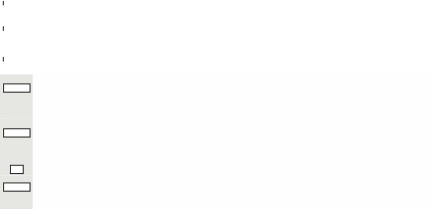
RESIDENT ASSESSMENT AND CARE SCREENING
 Nursing
Home
Part
A
PPS
Discharge
(NPE)
Item
Set
Nursing
Home
Part
A
PPS
Discharge
(NPE)
Item
Set
Section A |
Identification Information |
|
A0050. Type of Record |
||
Enter Code |
|
|
A0100. Facility Provider Numbers |
||
|
|
|
A0200. Type of Provider. |
||
Enter Code |
Type of provider
|
|
A0310. Type of Assessment |
||
Enter Code
Enter Code
Enter Code
Enter Code |
A. Federal OBRA Reason for Assessment
99. None of the above |
|
B. PPS Assessment. PPS Scheduled Assessment for a Medicare Part A Stay 01. 5-day scheduled assessment PPS Unscheduled Assessment for a Medicare Part A Stay. 08. IPA - Interim Payment Assessment Not PPS Assessment. 99. None of the above |
||
E. Is this assessment the first assessment (OBRA, Scheduled PPS, or Discharge) since the most recent admission/entry or reentry?
|
||
F. Entry/discharge reporting 01. Entry tracking record
99. None of the above |
||
A0310 continued on next page |
||
Section A |
Identification Information |
|
A0310. Type of Assessment - Continued |
||
Enter Code
Enter Code |
G. Type of discharge - Complete only if A0310F = 10 or 11
|
|
H. Is this a SNF Part A PPS Discharge Assessment?
|
||
A0410. Unit Certification or Licensure Designation |
||
Enter Code |
|
|
A0500. Legal Name of Resident. |
||
|
A. First name: B. Middle initial:
C. Last name: D. Suffix: |
|
A0600. Social Security and Medicare Numbers |
||
|
A. Social Security Number: _ _
B. Medicare number: |
|
A0700. Medicaid Number - Enter "+" if pending, "N" if not a Medicaid recipient |
||
|
|
|
A0800. Gender |
||
Enter Code |
|
|
A0900. Birth Date |
||
|
_ _ Month Day Year |
|
A1005. Ethnicity. Are you of Hispanic, Latino/a, or Spanish origin? |
||
Check all that apply |
||
|
A. No, not of Hispanic, Latino/a, or Spanish origin |
|
B. Yes, Mexican, Mexican American, Chicano/a |
||
C. Yes, Puerto Rican |
||
D. Yes, Cuban |
||
E. Yes, another Hispanic, Latino/a, or Spanish origin |
||
X. Resident unable to respond |
||
Y. Resident declines to respond |
||
















Section A |
Identification Information |
|
A1010. Race What is your race? |
||
Check all that apply. |
||
|
A. White |
|
B. Black or African American |
||
C. American Indian or Alaska Native |
||
D. Asian Indian |
||
E. Chinese |
||
F. Filipino |
||
G. Japanese. |
||
H. Korean |
||
I. Vietnamese |
||
J. Other Asian |
||
K. Native Hawaiian |
||
L. Guamanian or Chamorro |
||
M. Samoan |
||
N. Other Pacific Islander |
||
X. Resident unable to respond |
||
Y. Resident declines to respond |
||
Z. None of the above |
||
A1200. Marital Status |
||
Enter Code |
|
|
A1250. Transportation (from NACHC©) Has lack of transportation kept you from medical appointments, meetings, work, or from getting things needed for daily living? |
||
Check all that apply |
||
|
A. Yes, it has kept me from medical appointments or from getting my medications |
|
B. Yes, it has kept me from non-medical meetings, appointments, work, or from getting things that I need |
||
C. No |
||
X. Resident unable to respond |
||
Y. Resident declines to respond |
||
© 2019. National Association of Community Health Centers, Inc., Association of Asian Pacific Community Health Organizations, Oregon Primary Care Association. PRAPARE and its resources are proprietary information of NACHC and its partners, intended for use by NACHC, its partners, and authorized recipients. Do not publish, copy, or distribute this information in part or whole without written consent from NACHC. |
||













Section A |
Identification Information |
|
A1300. Optional Resident Items |
||
|
|
|
Most Recent Admission/Entry or Reentry into this Facility |
|
A1600. Entry Date |
|
|
_ _ Month Day Year |
A1700. Type of Entry |
|
Enter Code |
|
A1805. Entered From |
|
Enter Code |
99. Not listed |
Section A |
Identification Information |
||
A1900. Admission Date (Date this episode of care in this facility began) |
|||
|
_ _ Month Day Year |
||
A2000. Discharge Date Complete only if A0310F = 10, 11, or 12 |
|||
|
_ _ Month Day Year |
||
A2121. Provision of Current Reconciled Medication List to Subsequent Provider at Discharge Complete only if A0310H = 1 and A2105 = 02-12 |
|||
Enter Code |
At the time of discharge to another provider, did your facility provide the resident's current reconciled medication list to the subsequent provider?
|
||
A2122. Route of Current Reconciled Medication List Transmission to Subsequent Provider Indicate the route(s) of transmission of the current reconciled medication list to the subsequent provider. Complete only if A2121 = 1 |
|||
Check all that apply Route of Transmission |
|||
|
A. Electronic Health Record |
||
B. Health Information Exchange |
|||
C. Verbal (e.g., in-person, telephone, video conferencing) |
|||
D. Paper-based (e.g., fax, copies, printouts) |
|||
E. Other methods (e.g., texting, email, CDs) |
|||




![]()


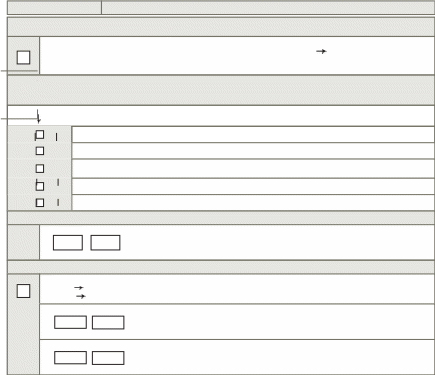 Section
A Identification
Information
Section
A Identification
Information
A2123. Provision of Current Reconciled Medication List to Resident at Discharge
Complete only if A0310H = 1 and A2105 = 01, 99
At the time of discharge, did your facility provide the resident's current reconciled medication list to the resident, family and/or caregiver?
Enter Code
No - Current reconciled medication list not provided to the resident, family and/or caregiver Skip to A2300, Assessment Reference Date
Yes - Current reconciled medication list provided to the resident, family and/or caregiver
A2124. Route of Current Reconciled Medication List Transmission to Resident
Indicate the route(s) of transmission of the current reconciled medication list to the resident/family/caregiver. Complete only if A2123 = 1
Check all that apply
Route of Transmission
Electronic Health Record (e.g., electronic access to patient portal)
Health Information Exchange
Verbal (e.g., in-person, telephone, video conferencing)
Paper-based (e.g., fax, copies, printouts)
Other methods (e.g., texting, email, CDs)
A2300. Assessment Reference Date
Observation end date:
_
Month
A2400. Medicare Stay
_
Day

Enter Code
Has the resident had a Medicare-covered stay since the most recent entry?
No Skip to B1300, Health Literacy.
Yes Continue to A2400B, Start date of most recent Medicare stay
Start date of most recent Medicare stay:
_
Month
_
Day
|
|
|
|
Year
End date of most recent Medicare stay - Enter dashes if stay is ongoing:
_
Month
_
Day
|
|
|
|
Year


Section B |
Hearing, Speech, and Vision |
|
B1300. Health Literacy |
||
Enter Code |
How often do you need to have someone help you when you read instructions, pamphlets, or other written material from your doctor or pharmacy?
|
|
The Single Item Literacy Screener is licensed under a Creative Commons Attribution-NonCommercial 4.0 International License. |
||
Brief
Interview
for
Mental
Status
(BIMS)
C0200.
Repetition
of
Three
Words
Enter
Code
Ask
resident:
“I
am
going
to
say
three
words
for
you
to
remember.
Please
repeat
the
words
after
I
have
said
all
three. The
words
are:
sock,
blue,
and
bed.
Now
tell
me
the
three
words.” Number
of
words
repeated
after
first
attempt None One Two Three After
the
resident's
first
attempt,
repeat
the
words
using
cues
("sock,
something
to
wear;
blue,
a
color;
bed,
a
piece of
furniture").
You
may
repeat
the
words
up
to
two
more
times.
C0300.
Temporal
Orientation
(orientation
to
year,
month,
and
day)
Enter
Code Enter
Code Enter
Code
Ask
resident:
"Please
tell
me
what
year
it
is
right
now." A.
Able
to
report
correct
year Missed
by
>
5
years
or
no
answer Missed
by
2-5
years Missed
by
1
year Correct
Ask
resident:
"What
month
are
we
in
right
now?" B.
Able
to
report
correct
month Missed
by
>
1
month
or
no
answer Missed
by
6
days
to
1
month Accurate
within
5
days
Ask
resident:
"What
day
of
the
week
is
today?" C.
Able
to
report
correct
day
of
the
week Incorrect
or
no
answer Correct
C0400.
Recall
Enter
Code Enter
Code Enter
Code
Ask
resident:
"Let's
go
back
to
an
earlier
question.
What
were
those
three
words
that
I
asked
you
to
repeat?" If
unable
to
remember
a
word,
give
cue
(something
to
wear;
a
color;
a
piece
of
furniture)
for
that
word. A.
Able
to
recall
"sock" No
-
could
not
recall Yes,
after
cueing
("something
to
wear") Yes,
no
cue
required
B.
Able
to
recall
"blue" No
-
could
not
recall Yes,
after
cueing
("a
color") Yes,
no
cue
required
C.
Able
to
recall
"bed" No
-
could
not
recall Yes,
after
cueing
("a
piece
of
furniture") Yes,
no
cue
required
C0500.
BIMS
Summary
Score
Enter
Score
Add
scores
for
questions
C0200-C0400
and
fill
in
total
score
(00-15) Enter
99
if
the
resident
was
unable
to
complete
the
interview




![]()
![]()

C0100. Should Brief Interview for Mental Status (C0200-C0500) be Conducted? Attempt to conduct interview with all residents |
|
Enter Code |
|





Section C |
Cognitive Patterns |
||
Delirium |
|||
C1310. Signs and Symptoms of Delirium (from CAM©) |
|||
A. Acute Onset Mental Status Change |
|||
Enter Code |
Is there evidence of an acute change in mental status from the resident's baseline?
|
||
Coding:
|
Enter Codes in Boxes |
||
|
B. Inattention - Did the resident have difficulty focusing attention, for example, being easily distractible or having difficulty keeping track of what was being said? |
||
C. Disorganized Thinking - Was the resident's thinking disorganized or incoherent (rambling or irrelevant conversation, unclear or illogical flow of ideas, or unpredictable switching from subject to subject)? |
|||
D. Altered Level of Consciousness - Did the resident have altered level of consciousness, as indicated by any of the following criteria?
|
|||
Adapted from: Inouye SK, et al. Ann Intern Med. 1990; 113: 941-948. Confusion Assessment Method. Copyright 2003, Hospital Elder Life Program, LLC. Not to be reproduced without permission. |
|||


![]()
![]()

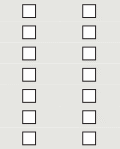


D0100. Should Resident Mood Interview be Conducted? If A0310G = 2 skip to D0700. Otherwise, attempt to conduct interview with all residents |
|
Enter Code |
|
D0150. Resident Mood Interview (PHQ-2 to 9©) |
|||
Say to resident: "Over the last 2 weeks, have you been bothered by any of the following problems?" |
|||
If symptom is present, enter 1 (yes) in column 1, Symptom Presence. If yes in column 1, then ask the resident: "About how often have you been bothered by this?" Read and show the resident a card with the symptom frequency choices. Indicate response in column 2, Symptom Frequency. |
|||
9. No response (leave column 2 2. 7-11 days (half or more of the days) blank) 3. 12-14 days (nearly every day) |
1. Symptom Presence |
2. Symptom Frequency |
|
|
|||
A. Little interest or pleasure in doing things |
|
|
|
B. Feeling down, depressed, or hopeless |
|
|
|
If either D0150A2 or D0150B2 is coded 2 or 3, CONTINUE asking the questions below. If not, END the PHQ interview. |
|||
C. Trouble falling or staying asleep, or sleeping too much |
|
|
|
D. Feeling tired or having little energy |
|
|
|
E. Poor appetite or overeating |
|
|
|
F. Feeling bad about yourself - or that you are a failure or have let yourself or your family down |
|
|
|
G. Trouble concentrating on things, such as reading the newspaper or watching television |
|
|
|
H. Moving or speaking so slowly that other people could have noticed. Or the opposite - being so fidgety or restless that you have been moving around a lot more than usual |
|
|
|
I. Thoughts that you would be better off dead, or of hurting yourself in some way |
|
|
|
D0160. Total Severity Score |
|||
Enter Score |
Add scores for all frequency responses in Column 2, Symptom Frequency. Total score must be between 00 and 27. Enter 99 if unable to complete interview (i.e., Symptom Frequency is blank for 3 or more required items). |
||
D0700. Social Isolation |
|
Enter Code |
How often do you feel lonely or isolated from those around you?
|
![]()

 Copyright
©
Pfizer
Inc.
All
rights
reserved.
Reproduced
with
permission.
Copyright
©
Pfizer
Inc.
All
rights
reserved.
Reproduced
with
permission.
Section GG |
Functional Abilities and Goals - Discharge |
|
GG0130. Self-Care (Assessment period is the last 3 days of the Stay) Complete when A0310G is not = 2 and A0310H = 1 and A2400C minus A2400B is greater than 2 and A2105 is not = 04. |
||
Code the resident's usual performance at the end of the stay for each activity using the 6-point scale. If an activity was not attempted at the end of the stay, code the reason. |
||
Coding: Safety and Quality of Performance - If helper assistance is required because resident's performance is unsafe or of poor quality, score according to amount of assistance provided. Activities may be completed with or without assistive devices. 06. Independent - Resident completes the activity by themself with no assistance from a helper. 05. Setup or clean-up assistance - Helper sets up or cleans up; resident completes activity. Helper assists only prior to or following the activity. 04. Supervision or touching assistance - Helper provides verbal cues and/or touching/steadying and/or contact guard assistance as resident completes activity. Assistance may be provided throughout the activity or intermittently. 03. Partial/moderate assistance - Helper does LESS THAN HALF the effort. Helper lifts, holds, or supports trunk or limbs, but provides less than half the effort. 02. Substantial/maximal assistance - Helper does MORE THAN HALF the effort. Helper lifts or holds trunk or limbs and provides more than half the effort. 01. Dependent - Helper does ALL of the effort. Resident does none of the effort to complete the activity. Or, the assistance of 2 or more helpers is required for the resident to complete the activity. If activity was not attempted, code reason: 07. Resident refused 09. Not applicable - Not attempted and the resident did not perform this activity prior to the current illness, exacerbation, or injury. 10. Not attempted due to environmental limitations (e.g., lack of equipment, weather constraints) 88. Not attempted due to medical condition or safety concerns |
||
3. Discharge Performance |
|
|
Enter Codes in Boxes
|
||
|
A. Eating: The ability to use suitable utensils to bring food and/or liquid to the mouth and swallow food and/or liquid once the meal is placed before the resident. |
|
B. Oral hygiene: The ability to use suitable items to clean teeth. Dentures (if applicable): The ability to insert and remove dentures into and from the mouth, and manage denture soaking and rinsing with use of equipment. |
||
C. Toileting hygiene: The ability to maintain perineal hygiene, adjust clothes before and after voiding or having a bowel movement. If managing an ostomy, include wiping the opening but not managing equipment.. |
||
E. Shower/bathe self: The ability to bathe self, including washing, rinsing, and drying self (excludes washing of back and hair). Does not include transferring in/out of tub/shower. |
||
F. Upper body dressing: The ability to dress and undress above the waist; including fasteners, if applicable. |
||
G. Lower body dressing: The ability to dress and undress below the waist, including fasteners; does not include footwear. |
||
H. Putting on/taking off footwear: The ability to put on and take off socks and shoes or other footwear that is appropriate for safe mobility; including fasteners, if applicable. |
||
I. Personal hygiene: The ability to maintain personal hygiene, including combing hair, shaving, applying makeup, washing/drying face and hands (excludes baths, showers, and oral hygiene). |
||
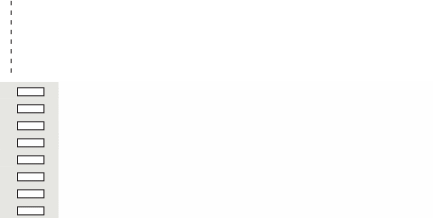
Section GG |
Functional Abilities and Goals - Discharge |
|
GG0170. Mobility (Assessment period is the last 3 days of the Stay) Complete when A0310G is not = 2 and A0310H = 1 and A2400C minus A2400B is greater than 2 and A2105 is not = 04. |
||
Code the resident's usual performance at the end of the stay for each activity using the 6-point scale. If an activity was not attempted at the end of the stay, code the reason. |
||
Coding: Safety and Quality of Performance - If helper assistance is required because resident's performance is unsafe or of poor quality, score according to amount of assistance provided. Activities may be completed with or without assistive devices. 06. Independent - Resident completes the activity by themself with no assistance from a helper. 05. Setup or clean-up assistance - Helper sets up or cleans up; resident completes activity. Helper assists only prior to or following the activity. 04. Supervision or touching assistance - Helper provides verbal cues and/or touching/steadying and/or contact guard assistance as resident completes activity. Assistance may be provided throughout the activity or intermittently. 03. Partial/moderate assistance - Helper does LESS THAN HALF the effort. Helper lifts, holds, or supports trunk or limbs, but provides less than half the effort. 02. Substantial/maximal assistance - Helper does MORE THAN HALF the effort. Helper lifts or holds trunk or limbs and provides more than half the effort. 01. Dependent - Helper does ALL of the effort. Resident does none of the effort to complete the activity. Or, the assistance of 2 or more helpers is required for the resident to complete the activity. If activity was not attempted, code reason: 07. Resident refused 09. Not applicable - Not attempted and the resident did not perform this activity prior to the current illness, exacerbation, or injury. 10. Not attempted due to environmental limitations (e.g., lack of equipment, weather constraints) 88. Not attempted due to medical condition or safety concerns |
||
3. Discharge Performance |
|
|
Enter Codes in Boxes
|
||
|
A. Roll left and right: The ability to roll from lying on back to left and right side, and return to lying on back on the bed. |
|
B. Sit to lying: The ability to move from sitting on side of bed to lying flat on the bed. |
||
C. Lying to sitting on side of bed: The ability to move from lying on the back to sitting on the side of the bed and with no back support. |
||
D. Sit to stand: The ability to come to a standing position from sitting in a chair, wheelchair, or on the side of the bed.. |
||
E. Chair/bed-to-chair transfer: The ability to transfer to and from a bed to a chair (or wheelchair). |
||
F. Toilet transfer: The ability to get on and off a toilet or commode. |
||
FF. Tub/shower transfer: The ability to get in and out of a tub/shower. |
||
G. Car transfer: The ability to transfer in and out of a car or van on the passenger side. Does not include the ability to open/ close door or fasten seat belt. |
||
I. Walk 10 feet: Once standing, the ability to walk at least 10 feet in a room, corridor, or similar space. If discharge performance is coded 07, 09, 10, or 88 Skip to GG0170M, 1 step (curb) |
||
J. Walk 50 feet with two turns: Once standing, the ability to walk at least 50 feet and make two turns. |
||
K. Walk 150 feet: Once standing, the ability to walk at least 150 feet in a corridor or similar space. |
||
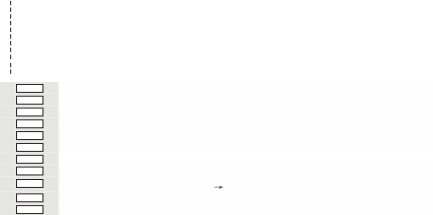
Section GG |
Functional Abilities and Goals - Discharge |
||
GG0170. Mobility (Assessment period is the last 3 days of the Stay) Complete when A0310G is not = 2 and A0310H = 1 and A2400C minus A2400B is greater than 2 and A2105 is not = 04. |
|||
Code the resident's usual performance at the end of the stay for each activity using the 6-point scale. If an activity was not attempted at the end of the stay, code the reason. |
|||
Coding: Safety and Quality of Performance - If helper assistance is required because resident's performance is unsafe or of poor quality, score according to amount of assistance provided. Activities may be completed with or without assistive devices. 06. Independent - Resident completes the activity by themself with no assistance from a helper. 05. Setup or clean-up assistance - Helper sets up or cleans up; resident completes activity. Helper assists only prior to or following the activity. 04. Supervision or touching assistance - Helper provides verbal cues and/or touching/steadying and/or contact guard assistance as resident completes activity. Assistance may be provided throughout the activity or intermittently. 03. Partial/moderate assistance - Helper does LESS THAN HALF the effort. Helper lifts, holds, or supports trunk or limbs, but provides less than half the effort. 02. Substantial/maximal assistance - Helper does MORE THAN HALF the effort. Helper lifts or holds trunk or limbs and provides more than half the effort. 01. Dependent - Helper does ALL of the effort. Resident does none of the effort to complete the activity. Or, the assistance of 2 or more helpers is required for the resident to complete the activity. If activity was not attempted, code reason: 07. Resident refused 09. Not applicable - Not attempted and the resident did not perform this activity prior to the current illness, exacerbation, or injury. 10. Not attempted due to environmental limitations (e.g., lack of equipment, weather constraints) 88. Not attempted due to medical condition or safety concerns |
|||
3. Discharge Performance |
|
||
Enter Codes in Boxes
|
|||
|
L. Walking 10 feet on uneven surfaces: The ability to walk 10 feet on uneven or sloping surfaces (indoor or outdoor), such as turf or gravel. |
||
M. 1 step (curb): The ability to go up and down a curb and/or up and down one step. If discharge performance is coded 07, 09, 10, or 88 Skip to GG0170P, Picking up object. |
|||
N. 4 steps: The ability to go up and down four steps with or without a rail. If discharge performance is coded 07, 09, 10, or 88 Skip to GG0170P, Picking up object. |
|||
O. 12 steps: The ability to go up and down 12 steps with or without a rail. |
|||
P. Picking up object: The ability to bend/stoop from a standing position to pick up a small object, such as a spoon, from the floor. |
|||
|
Q3. Does the resident use a wheelchair and/or scooter?
|
||
R. Wheel 50 feet with two turns: Once seated in wheelchair/scooter, the ability to wheel at least 50 feet and make two turns. |
|||
|
RR3. Indicate the type of wheelchair or scooter used.
|
||
S. Wheel 150 feet: Once seated in wheelchair/scooter, the ability to wheel at least 150 feet in a corridor or similar space. |
|||
|
SS3. Indicate the type of wheelchair or scooter used.
|
||
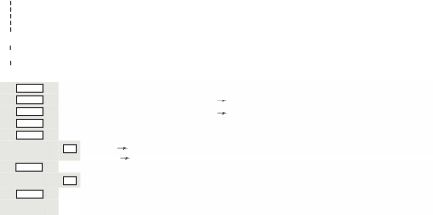
![]()


![]()
![]()

![]()



|
|
J0200. Should Pain Assessment Interview be Conducted? Attempt to conduct interview with all residents. If resident is comatose or if A0310G = 2 , skip to J1800. Any Falls Since Admission/Entry or Reentry or Prior Assessment (OBRA or Scheduled PPS). Otherwise, attempt to conduct interview with all residents. |
|
Enter Code |
|
|
|
Pain Assessment Interview |
|
J0300. Pain Presence |
|
Enter Code |
Ask resident: "Have you had pain or hurting at any time in the last 5 days?"
9. Unable to answer Skip to J1800. Any Falls Since Admission/Entry or Reentry or Prior Assessment (OBRA or Scheduled PPS), whichever is more recent |
J0510. Pain Effect on Sleep |
|
Enter Code |
Ask resident: "Over the past 5 days, how much of the time has pain made it hard for you to sleep at night?"
8. Unable to answer |
J0520. Pain Interference with Therapy Activities |
|
Enter Code |
Ask resident: "Over the past 5 days, how often have you limited your participation in rehabilitation therapy sessions due to pain?”
8. Unable to answer |
J0530. Pain Interference with Day-to-Day Activities |
|
Enter Code |
Ask resident: "Over the past 5 days, how often have you limited your day-to-day activities (excluding rehabilitation therapy sessions) because of pain?”
8. Unable to answer |



Section J |
Health Conditions |
||
J1800. Any Falls Since Admission/Entry or Reentry or Prior Assessment (OBRA or Scheduled PPS), whichever is more recent |
|||
Enter Code |
Has the resident had any falls since admission/entry or reentry or the prior assessment (OBRA or Scheduled PPS), whichever is more recent?
|
||
J1900. Number of Falls Since Admission/Entry or Reentry or Prior Assessment (OBRA or Scheduled PPS), whichever is more recent. |
|||
Coding:
|
Enter Codes in Boxes |
||
|
A. No injury - no evidence of any injury is noted on physical assessment by the nurse or primary care clinician; no complaints of pain or injury by the resident; no change in the resident's behavior is noted after the fall |
||
B. Injury (except major) - skin tears, abrasions, lacerations, superficial bruises, hematomas and sprains; or any fall-related injury that causes the resident to complain of pain |
|||
C. Major injury - bone fractures, joint dislocations, closed head injuries with altered consciousness, subdural hematoma |
|||

K0520. Nutritional Approaches Check all of the following nutritional approaches that apply. |
|
4. At Discharge Assessment period is the last 3 days of the SNF PPS Stay ending on A2400C |
4. At Discharge |
Check all that apply |
|
A. Parenteral/IV feeding |
|
B. Feeding tube (e.g., nasogastric or abdominal (PEG)) |
|
C. Mechanically altered diet - require change in texture of food or liquids (e.g., pureed food, thickened liquids) |
|
D. Therapeutic diet (e.g., low salt, diabetic, low cholesterol) |
|
Z. None of the above |
|
Section M |
Skin Conditions |
|
Report based on highest stage of existing ulcers/injuries at their worst; do not "reverse" stage |
||
M0210. Unhealed Pressure Ulcers/Injuries |
||
Enter Code |
Does this resident have one or more unhealed pressure ulcers/injuries?
|
|
M0300. Current Number of Unhealed Pressure Ulcers/Injuries at Each Stage |
||
Enter Number
Enter Number
Enter Number
Enter Number
Enter Number
Enter Number
Enter Number
Enter Number
Enter Number
Enter Number
Enter Number
Enter Number |
B. Stage 2: Partial thickness loss of dermis presenting as a shallow open ulcer with a red or pink wound bed, without slough. May also present as an intact or open/ruptured blister
|
|
C. Stage 3: Full thickness tissue loss. Subcutaneous fat may be visible but bone, tendon or muscle is not exposed. Slough may be present but does not obscure the depth of tissue loss. May include undermining and tunneling
D. Stage 4: Full thickness tissue loss with exposed bone, tendon or muscle. Slough or eschar may be present on some parts of the wound bed. Often includes undermining and tunneling
|
||
E. Unstageable - Non-removable dressing/device: Known but not stageable due to non-removable dressing/device
F. Unstageable - Slough and/or eschar: Known but not stageable due to coverage of wound bed by slough and/or eschar
G. Unstageable - Deep tissue injury:
|
||


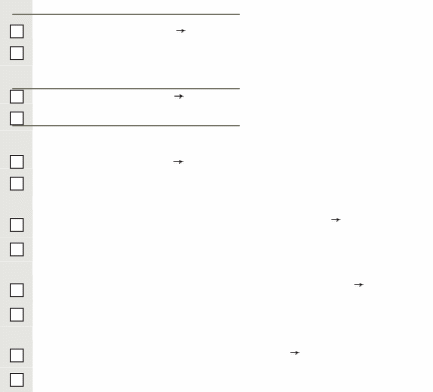
Section N |
Medications |
|||
N0415. High-Risk Drug Classes: Use and Indication |
||||
Check if the resident is taking any medications by pharmacological classification, not how it is used, during the last 7 days or since admission/entry or reentry if less than 7 days
If Column 1 is checked, check if there is an indication noted for all medications in the drug class |
1. Is taking |
2. Indication noted |
||
Check all that apply |
||||
A. Antipsychotic |
|
|
||
B. Antianxiety. |
||||
C. Antidepressant. |
||||
D. Hypnotic |
||||
E. Anticoagulant (e.g., warfarin, heparin, or low-molecular weight heparin) |
||||
F. Antibiotic |
||||
G. Diuretic. |
||||
H. Opioid |
||||
I. Antiplatelet |
||||
J. Hypoglycemic (including insulin) |
||||
Z. None of the above |
|
|||
N2005. Medication Intervention - Complete only if A0310H = 1 |
||||
Enter Code |
Did the facility contact and complete physician (or physician-designee) prescribed/recommended actions by midnight of the next calendar day each time potential clinically significant medication issues were identified since the admission? 0. No 1. Yes 9. NA - There were no potential clinically significant medication issues identified since admission or resident is not taking any medications |
|||

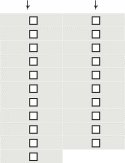

Section O |
Special Treatments, Procedures, and Programs |
|
O0110. Special Treatments, Procedures, and Programs Check all of the following treatments, procedures, and programs that were performed |
||
c. At Discharge Assessment period is the last 3 days of the SNF PPS Stay ending on A2400C |
c. At Discharge |
|
Check all that apply |
||
Cancer Treatments |
||
A1. Chemotherapy |
|
|
A2. IV |
||
A3. Oral |
||
A10. Other |
||
B1. Radiation |
||
Respiratory Treatments |
||
C1. Oxygen therapy |
|
|
C2. Continuous |
||
C3. Intermittent |
||
C4. High-concentration |
||
D1. Suctioning |
||
D2. Scheduled |
||
D3. As needed |
||
E1. Tracheostomy care |
||
F1. Invasive Mechanical Ventilator (ventilator or respirator) |
||
G1. Non-invasive Mechanical Ventilator |
||
G2. BiPAP |
||
G3. CPAP |
||
Other |
||
H1. IV Medications |
|
|
H2. Vasoactive medications |
||
H3. Antibiotics |
||
H4. Anticoagulant |
||
H10. Other |
||
I1. Transfusions |
||
O0110 continued on next page |
||


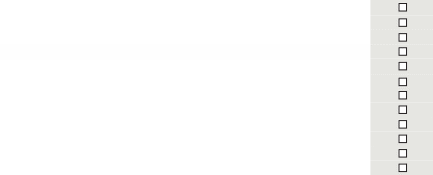



Section O |
Special Treatments, Procedures, and Programs |
|
O0110. Special Treatments, Procedures, and Programs Check all of the following treatments, procedures, and programs that were performed |
||
c. At Discharge Assessment period is the last 3 days of the SNF PPS Stay ending on A2400C |
c. At Discharge |
|
Check all that apply |
||
J1. Dialysis |
|
|
J2. Hemodialysis |
||
J3. Peritoneal dialysis |
||
K1. Hospice care. |
|
|
M1. Isolation or quarantine for active infectious disease (does not include standard body/fluid precautions) |
||
O1. IV Access |
|
|
O2. Peripheral |
||
O3. Midline |
||
O4. Central (e.g., PICC, tunneled, port) |
||
None of the Above |
||
Z1. None of the above |
|
|
Section O
O0425. Part A Therapies
Complete only if A0310H = 1
Special Treatments, Procedures, and Programs
Enter Number of Minutes
Enter Number of Minutes
Enter Number of Minutes
Enter Number of Minutes
Enter Number of Days
Enter Number of Minutes
Enter Number of Minutes
Enter Number of Minutes
Enter Number of Minutes
Enter Number of Days
Enter Number of Minutes
Enter Number of Minutes
Enter Number of Minutes
Enter Number of Minutes
Enter Number of Days
Speech-Language Pathology and Audiology Services

Individual minutes - record the total number of minutes this therapy was administered to the resident individually
since the start date of the resident's most recent Medicare Part A stay (A2400B)

Concurrent minutes - record the total number of minutes this therapy was administered to the resident concurrently with one other resident since the start date of the resident's most recent Medicare Part A stay (A2400B)

Group minutes - record the total number of minutes this therapy was administered to the resident as part of a group of residents since the start date of the resident's most recent Medicare Part A stay (A2400B)
If the sum of individual, concurrent, and group minutes is zero, skip to O0425B, Occupational Therapy.

Co-treatment minutes - record the total number of minutes this therapy was administered to the resident in
co-treatment sessions since the start date of the resident's most recent Medicare Part A stay (A2400B)
Days - record the number of days this therapy was administered for at least 15 minutes a day since the start date of the resident's most recent Medicare Part A stay (A2400B)
Occupational Therapy

Individual minutes - record the total number of minutes this therapy was administered to the resident individually
since the start date of the resident's most recent Medicare Part A stay (A2400B)

Concurrent minutes - record the total number of minutes this therapy was administered to the resident concurrently with one other resident since the start date of the resident's most recent Medicare Part A stay (A2400B)

Group minutes - record the total number of minutes this therapy was administered to the resident as part of a group of residents since the start date of the resident's most recent Medicare Part A stay (A2400B)
If the sum of individual, concurrent, and group minutes is zero, skip to O0425C, Physical Therapy

Co-treatment minutes - record the total number of minutes this therapy was administered to the resident in
co-treatment sessions since the start date of the resident's most recent Medicare Part A stay (A2400B)
Days - record the number of days this therapy was administered for at least 15 minutes a day since the start date of the resident's most recent Medicare Part A stay (A2400B)
Physical Therapy

Individual minutes - record the total number of minutes this therapy was administered to the resident individually
since the start date of the resident's most recent Medicare Part A stay (A2400B)

Concurrent minutes - record the total number of minutes this therapy was administered to the resident concurrently with one other resident since the start date of the resident's most recent Medicare Part A stay (A2400B)

Group minutes - record the total number of minutes this therapy was administered to the resident as part of a group of residents since the start date of the resident's most recent Medicare Part A stay (A2400B)
If the sum of individual, concurrent, and group minutes is zero, skip to O0430, Distinct Calendar Days of Part A Therapy.

Co-treatment minutes - record the total number of minutes this therapy was administered to the resident in
co-treatment sessions since the start date of the resident's most recent Medicare Part A stay (A2400B)
Days - record the number of days this therapy was administered for at least 15 minutes a day since the start date of the resident's most recent Medicare Part A stay (A2400B)
O0430. Distinct Calendar Days of Part A Therapy
Complete only if A0310H = 1
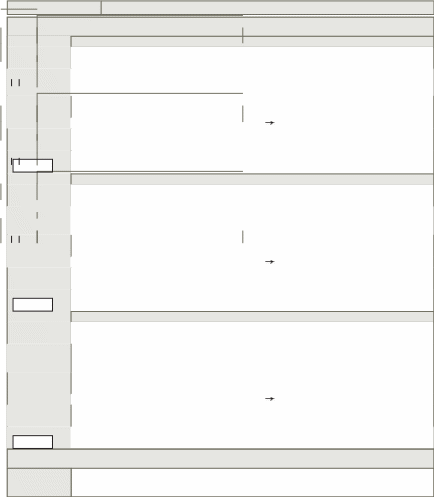 Enter
Number
of
Days
Enter
Number
of
Days
Record the number of calendar days that the resident received Speech-Language Pathology and Audiology Services, Occupational Therapy, or Physical Therapy for at least 15 minutes since the start date of the resident's most recent Medicare Part A stay (A2400B)
Complete Section X only if A0050 = 2 or 3
Identification of Record to be Modified/Inactivated - The following items identify the existing assessment record that is in error. In this section, reproduce the information EXACTLY as it appeared on the existing erroneous record, even if the information is incorrect.
This information is necessary to locate the existing record in the National MDS Database.
X0150. Type of Provider (A0200 on existing record to be modified/inactivated)
Enter Code
Type of provider
Nursing home (SNF/NF)
Swing Bed
X0200. Name of Resident (A0500 on existing record to be modified/inactivated)
First name:
C. Last name:
X0300. Gender (A0800 on existing record to be modified/inactivated)
Enter Code
Male
Female
X0400. Birth Date (A0900 on existing record to be modified/inactivated)
_
Month
_
Day
|
|
|
|
Year
X0500. Social Security Number (A0600A on existing record to be modified/inactivated)


X0600. Type of Assessment (A0310 on existing record to be modified/inactivated)
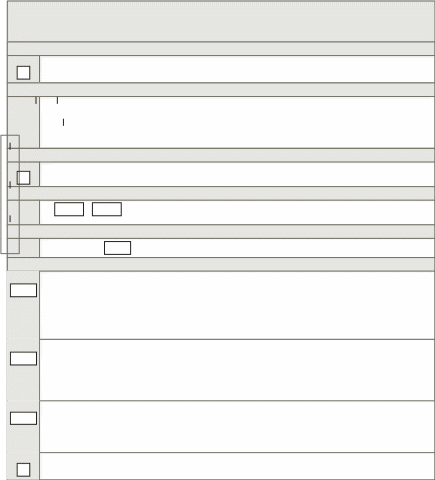
Enter Code
Enter Code
Enter Code
Enter Code
Federal OBRA Reason for Assessment
Admission assessment (required by day 14)
Quarterly review assessment
Annual assessment
Significant change in status assessment
Significant correction to prior comprehensive assessment
Significant correction to prior quarterly assessment
99. None of the above
PPS Assessment.
PPS Scheduled Assessment for a Medicare Part A Stay
5-day scheduled assessment
PPS Unscheduled Assessment for a Medicare Part A Stay.
08. IPA - Interim Payment Assessment
Not PPS Assessment
99. None of the above
Entry/discharge reporting
01. Entry tracking record
Discharge assessment-return not anticipated
Discharge assessment-return anticipated
Death in facility tracking record
99. None of the above
H. Is this a SNF Part A PPS Discharge Assessment?
No
Yes
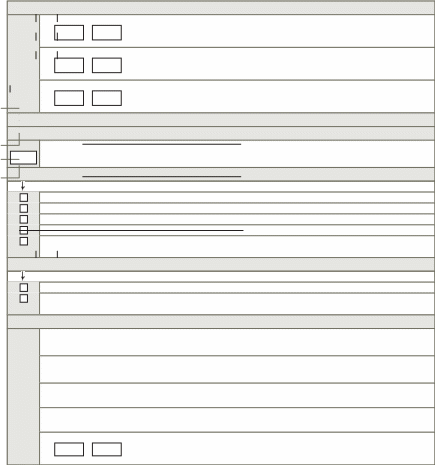 X0700.
Date
on
existing
record
to
be
modified/inactivated
-
Complete
one
only.
X0700.
Date
on
existing
record
to
be
modified/inactivated
-
Complete
one
only.
Assessment Reference Date (A2300 on existing record to be modified/inactivated) - Complete only if X0600F = 99
_
Month
_
Day
|
|
|
|
Year
Discharge Date (A2000 on existing record to be modified/inactivated) - Complete only if X0600F = 10, 11, or 12
_
Month
_
Day
|
|
|
|
Year
Entry Date (A1600 on existing record to be modified/inactivated) - Complete only if X0600F = 01
_
Month
_
Day
|
|
|
|
Year
Correction Attestation Section - Complete this section to explain and attest to the modification/inactivation request
X0800. Correction Number
Enter Number
Enter the number of correction requests to modify/inactivate the existing record, including the present one
X0900. Reasons for Modification - Complete only if Type of Record is to modify a record in error (A0050 = 2)
Check all that apply
Transcription error
Data entry error
Software product error
Item coding error.
Z. Other error requiring modification
If "Other" checked, please specify:
X1050. Reasons for Inactivation - Complete only if Type of Record is to inactivate a record in error (A0050 = 3)
Check all that apply
A. Event did not occur
Z. Other error requiring inactivation
If "Other" checked, please specify:
X1100. RN Assessment Coordinator Attestation of Completion
Attesting individual's first name:
Attesting individual's last name:
Attesting individual's title:
Signature
Attestation date
_
Month
_
Day
|
|
|
|
Year
Section Z |
Assessment Administration |
||||
Z0400. Signature of Persons Completing the Assessment or Entry/Death Reporting |
|||||
|
I certify that the accompanying information accurately reflects resident assessment information for this resident and that I collected or coordinated collection of this information on the dates specified. To the best of my knowledge, this information was collected in accordance with applicable Medicare and Medicaid requirements. I understand that this information is used as a basis for ensuring that residents receive appropriate and quality care, and as a basis for payment from federal funds. I further understand that payment of such federal funds and continued participation in the government-funded health care programs is conditioned on the accuracy and truthfulness of this information, and that I may be personally subject to or may subject my organization to substantial criminal, civil, and/or administrative penalties for submitting false information. I also certify that I am authorized to submit this information by this facility on its behalf. |
||||
Signature |
Title |
Sections |
Date Section Completed |
||
A. |
|
|
|
||
B. |
|
|
|
||
C. |
|
|
|
||
D. |
|
|
|
||
E. |
|
|
|
||
F. |
|
|
|
||
G. |
|
|
|
||
H. |
|
|
|
||
I. |
|
|
|
||
J. |
|
|
|
||
K. |
|
|
|
||
L. |
|
|
|
||
Z0500. Signature of RN Assessment Coordinator Verifying Assessment Completion |
|||||
|
A. Signature: B. Date RN Assessment Coordinator signed assessment as complete: _ _ Month Day Year |
||||




Legal Notice Regarding MDS 3.0 - Copyright 2011 United States of America and interRAI. This work may be freely used and distributed solely within the United States. Portions of the MDS 3.0 are under separate copyright protections; Pfizer Inc. holds the copyright for the PHQ-9; Confusion Assessment Method. © 1988, 2003, Hospital Elder Life Program. All rights reserved. Adapted from: Inouye SK et al. Ann Intern Med. 1990; 113:941-8. Both Pfizer Inc. and the Hospital Elder Life Program, LLC have granted permission to use these instruments in association with the MDS 3.0.
MDS
3.0
Nursing
Home
Part
A
PPS
Discharge
(NPE)
Version
1.18.11
Effective
10/01/2023
Page


| File Type | application/vnd.openxmlformats-officedocument.wordprocessingml.document |
| File Title | MDS 3.0 Nursing Home Part A PPS Discharge (NPE) Item Set |
| Subject | MDS 3.0 assessment items for nursing home Part A PPS Discharge assessments |
| Author | CMS |
| File Modified | 0000-00-00 |
| File Created | 2023-09-02 |
© 2026 OMB.report | Privacy Policy
